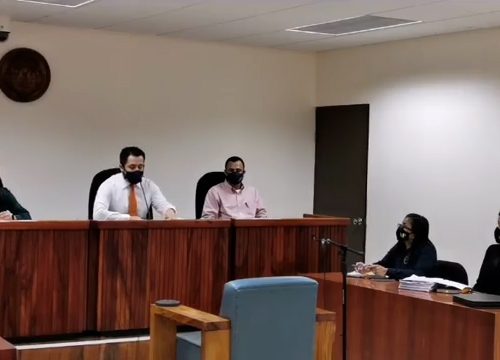
Ronaldi Sequeira Duarte never denied killing his wife. On March 5, 2018 he stabbed her 11 times and then set fire to the room they shared. The firefighters found Mariana Leiva’s body partially scorched. The assassin walked 500 meters to the police station and turned himself in.
In the four months that followed, he and his lawyers tried to justify the crime with arguments straight out of a sexist’s handbook. They said that the woman drove him to drink, that she treated him like a househusband, that she cheated on him and that, since she was a professional, she couldn’t be a victim of violence. All were arguments that sought to put the blame on the victim and not the assassin.
On Wednesday, the court confirmed it. Sequeria Duarte is guilty of femicide. The court sentenced him to 37 years in prison, 30 for the femicide of Mariana Leiva and seven for arson. The judges rejected the argument that the murderer acted “in a state of lost conscience,” which would have been legally considered to be a lesser category of murder.
During the trial’s closing arguments, The Voice of Guanacaste selected six of these arguments. Each one of them was rejected by the court, which was presided over by Verónica Elizondo, Andrea Rodríguez and Breiner Escamilla.
The portrait of a group of friends lacks a loud laugh and a family is missing a member. This was Mariana Leiva, victim of a femicide.
1- She drove him to drink
According to Sequeira, his life changed dramatically when he got together with Mariana and moved to Guanacaste. He said that Mariana drove him to drink more than he should and that the day he committed the femicide, he was under the influence of alcohol and drugs that he had been using for several days prior.
The court determined that Ronaldi used drugs and drank alcohol since the age of 13, and he even had a couple of previous relationships that ended because of his excessive drinking and drug use.
In April, psychologist and gender specialist Cynthia Castro, explained to The Voice Of Guanacaste that one of the myths of gender-based violence is to use alcohol problems to justify the aggression
2- She was unfaithful
Ronaldi Sequeira’s public defender insisted that “the straw that broke the camel’s back” was that Mariana told Ronaldi that she wanted to have children, but not with him, rather with another man. According to the public defender, this traumatized Ronaldi and pushed him to commit the crime without being aware of what he was doing.
But the judge argued that “this is not enough for him to have killed Mariana (…) The way in which he killed her has no justification.”
3- Mariana wasn’t a victim of violence because she was a professional and independent
Ronaldi’s public defender, Adrián Carmona, emphasized the importance of knowing who Mariana was because, according to him, this would indicate whether or not she was a victim of domestic violence.
“A financially independent woman, that tells us a lot,” Carmona said, adding that “she was a professional, orderly and firm in her decisions, intelligent and with absolute control of her life and her possessions, with family support and definitively an empowered woman.”
Because of this, Carmona questioned if Mariana’s profile made her a victim of violence.
The lawyer’s argument is another one of the myths described by sociologist Castro in our special report on violence against women. Domestic aggressions happen in all social stratum and not only to people in the poor socioeconomic class.
Guanacaste prepares, little by little, for a future without gender violence. It’s not easy, but its crusaders are not giving up.
4- If he screamed loud and people heard him, it’s because he is a man
Neighbors would frequently hear Ronaldi’s screams. He justified it by saying “logically, I’m a man and I scream lound,” he said.
The screams, according to the judges, demonstrate a living dynamic that was full of violence and one in which Ronaldi was the protagonist, not the victim.
“Women also scream loud,” the judge said. “The one who neighbors heard was Ronaldi. The one who was taken away by the police once was Ronaldi.”
5- She reduced him to a simple househusband.
According to Ronaldi, Mariana wanted to reduce him to a “househusband” and didn’t let him work. He was unemployed and the whole situation led him to desperation and caused the death of the woman.
“Ronaldi tells us that on some occasions, because he wasn’t working, he had to take charge of the household chores. That is nothing new, he has to contribute to the house somehow,” the judge said.
“Logically, the one who stays in the house, the one who is unemployed must assume part of the household work and that doesn’t make him less of a man, and current standards have allowed women to have a more active role in the economy,” the judge said.
6- Why didn’t her mother and sister, who are both doctors, help Mariana if she was a victim of domestic violence?
According to Ronald Sequeira’s public defender, it’s contradictory that professionals in medicine, Mariana’s sister and mother, took no action to file a case for the domestic violence that Andrea, Mariana’s sister, said existed between the couple.
“I’m talking about a family context in which everyone was a professional in medicine (the mother and the sister), where domestic violence is incompatible with mental and psychological health,” the public defender said. “In five years, they didn’t do anything to denounce the cycle of violence that Andrea said that she suffered at the hands of Ronaldi.”
911, courts, Inamu and offices on womens’ matters are some of the allies for those who suffer aggression and for their loved ones.
Psychologist Cynthia Castro had explained to The Voice of Guanacaste that “you can’t push a victim of domestic violence to file a criminal case,” but you can go with them to do it. Mariana’s sister, Andrea Leiva, said that she was willing on several occasions to accompany her sister to file a case, but that she never wanted to.
Nicoyan psychologist Gabriela Campos also explained that this is due to the fact that “the Guanacastecan woman says ‘I want to fix the situation with my partner,’” referring to the refusal to accept the fact that she is violated by her partner.
For the judges, none of these arguments were acceptable in order to shift blame away from Mariana Leiva’s murderer or reduce his sentence. He killed her in the place that is supposed to be the safest place for a person: her own home.







Comments